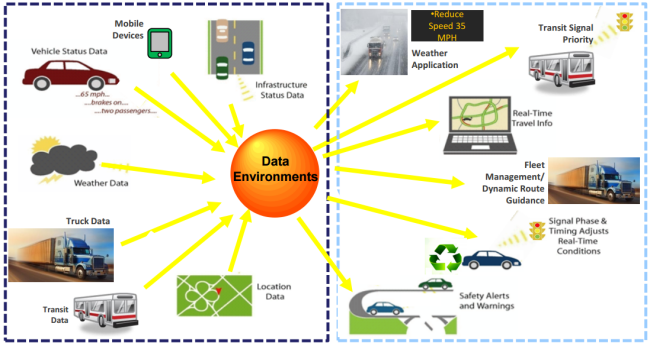NOCoE is Your Home for Big Data & TSM&O Resources

American spirit, ingenuity, and success are evident in the Nation’s canals, railways, highways, airports, and seaports. In 2009, this multimodal transportation system logged more than 392 billion person trips. In 2013, it moved the shipment of more than 20.1 billion tons (18.2 billion metric tons) of goods worth near $18 trillion, according to a recent report from the U.S. Bureau of Transportation Statistics. Capturing data like these helps with understanding not only how the U.S. transportation system is functioning, but also with determining how transportation professionals can improve it.
In the last 20 years, increases in the amount and availability of data--driven primarily by the near ubiquity of the Internet and wireless devices--have enabled the transportation community to understand issues in a timelier manner at both the micro and macro levels. This increase in data is both a challenge and an opportunity for the transportation community. It enables a more in-depth understanding of highway safety issues, travel behavior, and mobility, but it also demands significant technological resources and human capital investment to maintain.
BIG DATA OVERVIEW
Big data is a term for data sets that are so large or complex that traditional data processing application software is inadequate to deal with them. Challenges include capture, storage, analysis, data curation, search, sharing, transfer, visualization, querying, updating and information privacy. The term "big data" often refers simply to the use of predictive analytics, user behavior analytics, or certain other advanced data analytics methods that extract value from data, and seldom to a particular size of data set. "There is little doubt that the quantities of data now available are indeed large, but that’s not the most relevant characteristic of this new data ecosystem.
What Does Big Data Mean Now in Transportation Operations?
Examples of big data approaches or techniques being used in current transportation operations are limited. A number of current transportation projects, such as the Integrated Corridor Management (ICM) systems in San Diego and Dallas and several Michigan Department of Transportation agency fleet connected vehicle projects, feature a number of approaches common to big data. Although very valuable projects, they do not, however, illustrate the full potential for big data, including that which can be realized by applying big data when connected vehicles are widely deployed across the country. Big data examples are somewhat more prevalent in the private sector. Although big data approaches are not yet common, these sorts of examples of big data in transportation suggest that a great deal of potential exists for applying data in the coming traveler data-rich connected vehicle environment.
How Could We Integrate Big Data Practices into Transportation Operations in a Connected Vehicle Envi
- The importance of resolving data ownership issues and the implications for roles.
- Investigating potential use of a third-party data broker (or multiple brokers) – an approach that may help address ownership and funding needs (the cost of capturing and managing data may be cost-prohibitive for government but profitable for the private sector).
- Development of data standards is an important step, especially so if transportation agencies are not collecting and managing the data themselves.
- Considering approaches to reduce the volume of connected vehicle and traveler data so that it is more manageable while ensuring that all valuable data is collected.
- Utilization of specific technologies and techniques like crowdsourcing, cloud computing and federated database systems that have come to characterize the state-of-the-practice in big data and which will facilitate transportation operators or private sector data service providers in extracting value from connected-vehicle and traveler data.
Content from, FHWA: Big Data’s Implications for Transportation Operations, FHWA: Public Roads: Big Data
If you have any resources or publications about Big data and TSM&O want to publish here, please be sure to email us at nocoe@transportationops.org.